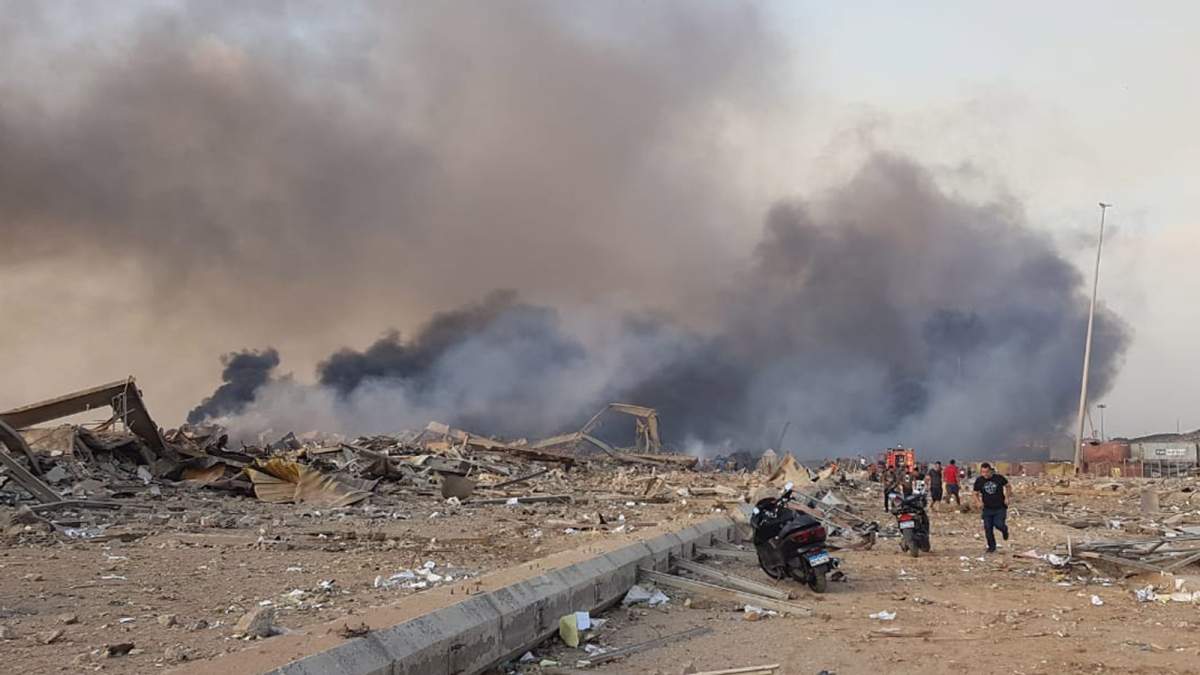More than 100 people are dead and thousands are injured after a massive explosion shook Lebanon’s capital Beirut on Tuesday, officials said.

An official with the Lebanese Red Cross said at least 100 people were killed and more than 4,000 were wounded. The official said the toll could rise further.
“People are asking the emergency department about their loved ones and it is difficult to search at night because there is no electricity,” Health Minister Hamad Hasan told Reuters. “We are facing a real catastrophe and need time to assess the extent of damages.”
Videos of the explosion show a huge blast followed by screaming and thick smoke rising over the city.
“I saw a fireball and smoke billowing over Beirut,” a witness told Reuters. “People were screaming and running, bleeding. Balconies were blown off buildings. Glass in high-rise buildings shattered and fell to the street.”

The head of the Red Cross in Lebanon, George Kettani called the blast a “huge catastrophe.”
“There are victims and casualties everywhere,” Kettani told broadcaster Mayadeen.
According to the Red Cross, hundreds of people have been taken to hospital, but many are trapped in damaged homes and buildings.
Beirut-based journalist Kareem Chehayeb tells 640 Toronto’s Morning Show the explosion is a result ‘corruption’ and ‘mismanagement’.
Lebanon’s internal security chief, Abbas Ibrahim, said the blast happened in the city’s port area and had a section that housed highly-explosive materials.
Ibrahim said initial information indicated that the material seized years ago had blown up.
Prime Minister Hassan Diab called the incident a “catastrophe” and said it “will not pass without accountability.”
“Those responsible will pay the price,” he said during a televised address. He said details about the “dangerous warehouse” would be made public.
Diab called for a day of mourning on Wednesday.
Lebanese President Michel Aoun said a state of emergency should be declared in Beirut for two weeks and called for an emergency meeting of the country’s Supreme Defence Council, according to the presidency’s Twitter account.

Get breaking National news
Aoun, in remarks published on the Presidency Twitter account, said it was “unacceptable” that 2,750 tonnes of ammonium nitrate was stored in a warehouse for six years without safety measures and vowed that those responsible would face the “harshest punishments”
Pictures and videos on social media show the devastation of the blast, with buildings in shambles, balconies collapsed and cars flipped over.

Lebanese broadcaster LBCI quoted Hotel Dieu Hospital in Beirut as saying that it was treating more than 500 injuries and was not able to receive more. The hospital also put out an urgent call for blood donations.
The office of the Daily Star newspaper was among the buildings damaged in the explosion. Video posted on social media shows the ceiling caved in and glass from windows shattered on the ground.
According to Zeina Khodr, an Al Jazeera reporter in Beirut, the explosion was felt across the city.
“I was kilometres away; the glass broke everywhere around me,” Khodr told Al Jazeera. “There is chaos in the streets.”
The U.S. Pentagon told Global News that is “aware of the explosion in Beirut and greatly concerned for the apparent loss of life from such destruction. ”
“We are actively monitoring developments but have nothing to offer regarding the cause of the explosion nor its aftermath,” a spokesperson said.

Many ex-pats around the world returned home as the coronavirus pandemic spread, but according to the federal registry of Canadians abroad, there are 10,960 Canadians currently registered in Lebanon.
In an email to Global News just before 8 p.m. ET, a spokesperson for Global Affairs Canada said the agency had received one request for consular services in Beirut.
“Global Affairs Canada is closely monitoring the tragic situation in Beirut,” the statement reads. “Our hearts are with the victims and their families.”
In a tweet Tuesday afternoon Prime Minister Justin Trudeau called the news “absolutely tragic.”
“Canadians are thinking of everyone who has been injured and all those who are trying to locate a friend or family member or have lost a loved one,” the tweet reads, “We’re keeping you in our thoughts ad we stand ready to assist in any way we can.”
Canadian Foreign Affairs Minister Francois-Philippe Champange said in a tweet that the government stands ready “to assist however we can.”
Speaking at a press conference Tuesday evening, U.S. President Donald Trump offered his “deepest sympathies” to the people of Beirut.
“Our prayers go out to all the victims and their families,” he said. “The United States stands ready to assist Lebanon. We have a very good relationship with the people of Lebanon and we will be there to help.”
Trump added that the incident “looks like a terrible attack.”
When asked later about his depiction of the explosion, Trump said that he had spoken with U.S. military officials who think the blast seemed to be an attack, “a bomb of some kind.”

The deadly explosions comes at a time when Lebanon is experiencing its worst economic and financial crisis in decades.
It also comes amid rising tensions between Israel and the militant Hezbollah group along Lebanon’s southern border.
Israeli officials said Israel had nothing to do with the blast, and said the country was ready to offer medical and humanitarian assistance.
Investigative journalist and founder of the news site Beirut Report, Habib Battah, said there is “great fear” in Lebanon after the explosion.
“There were hundreds of buildings and warehouses and they’re just gone and so there’s great fear,” he continued.
Battah said people were living in a “bad situation” in Lebanon before the explosion.
“I don’t know how many more things this country can humanly go through,” he said.
— With files from Global News’ Hannah Jackson, Reuters and the Associated Press













Comments
Want to discuss? Please read our Commenting Policy first.